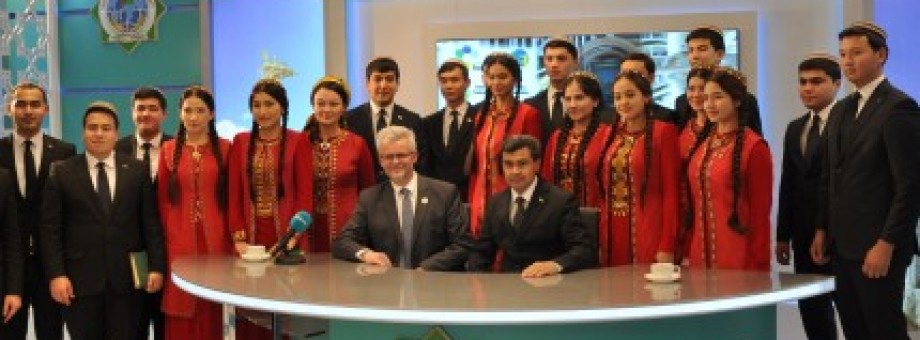A TELEVISION PROGRAM WITH THE SECRETARY GENERAL OF THE INTERNATIONAL ENERGY CHARTER

On November 28, 2017, a television program was shot in the training studio of the Institute of International Relations of the Ministry of Foreign Affairs of Turkmenistan with the Secretary-General of the International Energy Charter, Mr. Urban Rusnak, who arrived in Ashgabat to participate in the 28th session of the Energy Charter Conference.
Students of the Institute of International Relations of the Ministry of Foreign Affairs of Turkmenistan and the International University for the Humanities and Development took part in the program. At the program, they deepened their knowledge of the issues of Turkmenistan's energy diplomacy and also got acquainted with the current state of the world energy market.
During the TV program, Urban Rusnak noted that since 2014 the practice has been established according to which every year the Energy Charter must be presided by one country. On November 25-26, 2016, following the results of the meeting of the 27th session of the Energy Charter Conference that took place in Tokyo, Turkmenistan had been elected as chairman of this organization for 2017, and stressed that Turkmenistan successfully coped with this task.
Noting the fact that Turkmenistan became a member of this organization on July 17, 1997, the guest noted the great importance of the conference "Reliable and stable energy transit" that Turkmenistan held in Ashgabat on December 9, 2014 in cooperation with the Energy Charter. After this forum, the first meeting of a group of international experts took place in Ashgabat on December 10-11. The Secretary-General stressed that the regular meetings of experts took place on 22 April 2015 in the capital of the Kingdom of Belgium, Brussels, in 2015 in Beijing, in 2016 in the capital of Albania, Tirana and on May 31, 2017 in Ashgabat.
Within the framework of the television program, Mr. Urban Rusnak answered students' questions on the following topics: Turkmenistan's significant role in energy cooperation, its initiatives as a neutral state for ensuring energy security, potentials of the green economy and alternative energy sources, and energy consumption in the world in the future.


 NEWS
NEWS